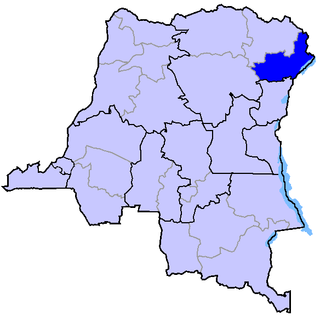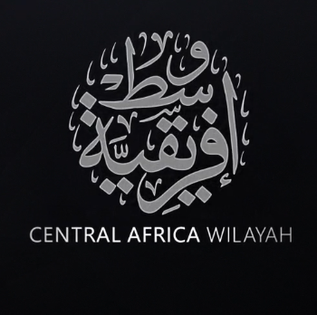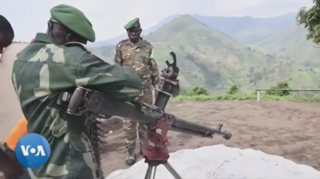
The Allied Democratic Forces is an Islamist rebel group in Uganda and the Democratic Republic of the Congo (DRC). It considered a terrorist organisation by the Ugandan government and the United States. It was originally based in western Uganda but has expanded into the neighbouring DRC. Most Ugandan ADF fighters are Muslims from the Baganda and Basoga ethnic groups.

The Nationalist and Integrationist Front is a rebel group active in the Ituri conflict in Ituri, Democratic Republic of the Congo, associated with the Lendu ethnic group. The FNI has fought against ethnic Hema and is blamed for the ambush and murder of nine United Nations peacekeepers near the town of Kafe in February 2005. FNI political leader Floribert Ndjabu was arrested by Congolese authorities, while military head Etienne Lona turned himself in.

The Ituri conflict is an ongoing low intensity asymmetrical conflict between the agriculturalist Lendu and pastoralist Hema ethnic groups in the Ituri region of the north-eastern Democratic Republic of the Congo (DRC). While the two groups had fought since as early as 1972, the name "Ituri conflict" refers to the period of intense violence between 1999 and 2003. Armed conflict continues to the present day.
The Union of Congolese Patriots is a political and militia group in Ituri, northeastern Democratic Republic of the Congo, formed towards the end of the Second Congo War. It was founded by Thomas Lubanga in 2001 and was one of six such groups that sprung up in the mineral-rich Ituri region on the border with Uganda in the Ituri conflict. The UPC supported and was primarily composed of the Hema ethnic group.

The Front for Patriotic Resistance in Ituri is a Bunia-based armed militia and political party primarily active in the south of the Ituri Province of northeastern Democratic Republic of the Congo.

The Kivu conflict is an umbrella term for a series of protracted armed conflicts in the North Kivu and South Kivu provinces in the eastern Democratic Republic of the Congo which have occurred since the end of the Second Congo War. Including neighboring Ituri province, there are more than 120 different armed groups active in the eastern Democratic Republic of Congo. Currently, some of the most active rebel groups include the Allied Democratic Forces, the Cooperative for the Development of the Congo, the March 23 Movement, and many local Mai Mai militias. In addition to rebel groups and the governmental FARDC troops, a number of national and international organizations have intervened militarily in the conflict, including the United Nations force known as MONUSCO, and an East African Community regional force.

The Allied Democratic Forces insurgency is an ongoing conflict waged by the Allied Democratic Forces in Uganda and the Democratic Republic of the Congo, against the governments of those two countries and the MONUSCO. The insurgency began in 1996, intensifying in 2013, resulting in hundreds of deaths. The ADF is known to currently control a number of hidden camps which are home to about 2,000 people; in these camps, the ADF operates as a proto-state with "an internal security service, a prison, health clinics, and an orphanage" as well as schools for boys and girls.

The Central Africa Province is an administrative division of the Islamic State (IS), a Salafi jihadist militant group and unrecognised quasi-state. As a result of a lack of information, the foundation date and territorial extent of the Central Africa Province are difficult to gauge, while the military strength and activities of the province's affiliates are disputed. The Central Africa Province initially covered all IS activities in the Democratic Republic of the Congo, Mozambique and Uganda. In September 2020, during the insurgency in Cabo Delgado, IS-CAP shifted its strategy from raiding to actually occupying territory, and declared the Mozambican town of Mocímboa da Praia its capital. After this point, however, the Mozambican branch declined and was split off from IS-CAP in 2022, becoming a separate IS province; as a result, this leaves IS-CAP to operate in the Democratic Republic of the Congo and Uganda.
This a timeline of the Kivu conflict during 2020.

CODECO is a loose association of various Lendu militia groups operating within the Democratic Republic of the Congo (DRC). The name is an abbreviation of the group's lesser-known full name, the Cooperative for Development of the Congo, sometimes also styled the Congo Economic Development Cooperative.
Mai-Mai Kyandenga is a Mai-Mai armed group operating in north-eastern Democratic Republic of the Congo. It claims to protect the local population of Beni Territory and their land. It still remains unclear what the actual goal of the group is and how much it has in connection with the Union of Patriots for the Liberation of Congo (ULPC), Allied Democratic Forces (ADF), and other Mai-Mai groups operating in the area.
On January 4, 2022, militiamen from the Twiganeho-Makanika armed group ambushed a convoy of Congolese soldiers in the village of Kagogo, South Kivu, Democratic Republic of the Congo.
Events of the year 2024 in the Democratic Republic of the Congo.

Between January 24 and 26, 2023, M23 rebels and Armed Forces of the Democratic Republic of the Congo (FARDC) soldiers fought over the city of Kitshanga. The battle was part of the renewed M23 offensive, and ended on January 26 with M23 forces capturing the city. Civilians accused both M23 and FARDC-aligned militias of war crimes during and after the battle.

The Second battle of Kitshanga broke out between Rwandan-backed M23 fighters and self-defense groups known as Wazalendo allied with the Congolese government. In January 2023, M23 rebels captured Kitshanga from the Congolese Army and allied forces in their renewed offensive in North Kivu. Wazalendo forces captured Kitshanga in early October 2023 as part of a counteroffensive, with the city switching hands between Wazalendo and the M23 after October 16, and a second M23 offensive on October 21 capturing the town.
On the night between May 16 and 17, 2020, militants from the Lendu CODECO killed twenty-two civilians in the Hema village of Ndjala, in Ituri Province, Democratic Republic of the Congo.
On October 24, 2020, militants from CODECO-ALC attacked Congolese and MONUSCO forces in the town of Dele, Ituri Province, Democratic Republic of the Congo. In response, Congolese forces launched an offensive against CODECO-ALC, capturing several towns from the group and killing its leader Mountain Wolf.
Operation Shujaa is an ongoing military offensive conducted by the Democratic Republic of the Congo and Uganda against insurgent forces in Kivu and Ituri, mainly Islamic State (IS) affiliates and the Allied Democratic Forces (ADF). Launched in November 2021, it has resulted in significant losses for the targeted rebel forces and substantially reduced their activity. At times, the government forces engaged in Operation Shujaa have also fought non-ADF/IS rebel groups.
On January 4, 2021, jihadists from the Allied Democratic Forces attacked the village of Mwenda, North Kivu, Democratic Republic of the Congo, killing 23 people. The massacre came several days after an attack on Tingwe that killed over 30 people.
On the night between May 30 and 31, 2021, jihadists from the Allied Democratic Forces attacked the towns of Boga and Tchabi, killing a total of fifty-seven civilians and injuring forty-seven others. The attacks were one of the deadliest massacres ever perpetrated by the ADF since its founding in the 1990s.









